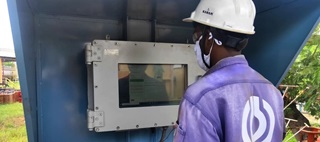Legacy system issues include multiple registration and repetitive information
The recording of all LPG movements is an important operational and safety requirement, but the current manual system requires the same information to be recorded many times during the movement cycle. This includes, driver name, driver signature, driver telephone number, truck registration number and is recorded on a manual system across multiple filling plants and terminals with a total of 130 individual registers. A massive amount of administration and it has been estimated that this means in excess of 30 million fields have to be completed every year!
Health & Safety and sustainability
The problems extend beyond the recording of information as the drivers are carrying large paper records in and around the plant areas and there are health issues as the frequent close contact with staff does compromise physical distancing that has been implemented. All records have to be kept and this large volume of paper used in the old system is a challenge to the vital safety strategy and the stated sustainability goals.
Access to data
The manual records clearly have weaknesses in both data recording and extraction for useful reporting even at the most basic level. It relies on driver signatures; these are often recorded quickly and have the inevitable handwriting legibility issues and mistakes do occur. It is also difficult to follow the trail of any recorded information and the reports required must be produced manually on spreadsheets every evening.
A digital Task Force
A digital Task Force was formed that included all stakeholders and IT representatives to review the current process, brainstorming how the Present Process could be moved to the New Process with a complete digitisation. All the current issues were tackled, including solving the additional challenges of the use of flameproof, intrinsic safe, computer terminals for the hazardous zones. The plan also included the training of all drivers, security guards and LPG staff, most of these colleagues had not worked on computers previously.
A successful filling plant pilot
In August 2020, we are pleased to report that the new system has been tested at one plant in Hyderabad location and all operators have found the new system easy to use. Operational efficiency has been significant with operators saving approximately 90 minutes per day.
The new system now removes the millions of repetitive records and has provided key reports on operational activity, tracking truck servicing time, waiting time in plant which would result in improved productivity and higher customer satisfaction scores.
The plan is now to install the new system at all the filling plants and terminals – a great result and a compliment to all involved in this project..


 }
}
 }
}
 }
}
 }
}